#Extatosoma
Explore tagged Tumblr posts
Text
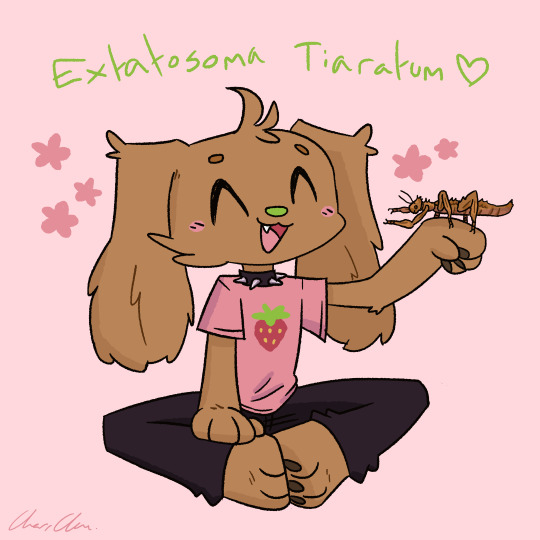
In memory of my pet phasmids, it's been a few years now but I still miss them.
#insects#phasmids#bugs#furry#i also had 3 phillium philipinicum#i had 2 extatosoma tiaratum#the leafies were called frog & danny phasmid & bulbasaur#the sticks were called ginger and spike#they died of old age they had a good life :)#not once did my extatosoma do a threat display#they only curl up like in typical photos when threatened#but mine were never scared#well all of them wiggled when i changed the bramble for them but i never stressed them out#i only had one leg drop too! danny phasmid got spooked by her sisters and i found her one leg down in the morning#it grew back tho :)#man ok enough rambling#my art#my post
9 notes
·
View notes
Text
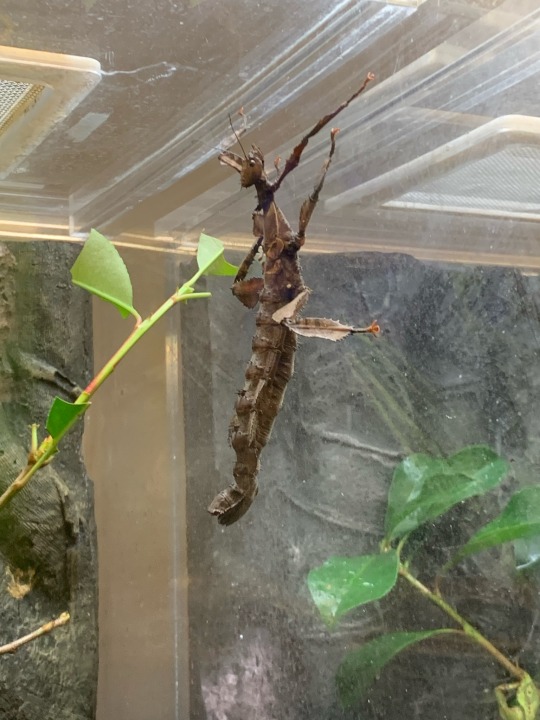
We’re on an Insect roll at the moment, and here is probably one of the coolest bugs I’ve ever seen: The Spiny Leaf Insect! They are also known as Australian Walking Sticks and are a species of Phasmatids.
Honestly, Spiny Leaf Insect sounds more like a general description than an actual name-
#Phylum: Arthropoda#Class: Insecta#Order: Phasmatodea#Family: Phasmatidae#Subfamily: Extatosomatinae#Genus: Extatosoma#Extatosoma tiaratum#Australian walking sticks#Spiny leaf insects#Walking sticks#leaf insects#Phasmatids#insects
0 notes
Note
I've kept extatosomas in the past!
They really don't need much in terms of entertainment, like said above they like to just eat and sleep. And I found that paper towels are the best bedding for them, switched out every 1-2 weeks with the food. I tried substrate before but the isopods and springtails weren't keeping up with the waste, and also didn't really seem interested in it (different acidity from blackberry leaves perhaps? Not as appetising?)
You can offer them some oak leaves every now and then if you'd like! But they do crunch on them... Which is noisy at night if you have them in your bedroom.
The lichen kind is quite rare! I tried to get 4 babies turned from brown parents with no success despite covering the enclosure top to bottom through their life stages. I feel if by L4 they haven't switched colours then it's past the time period where you can achieve it. Your best success with the lichen variety would be to get eggs from lichen parents, and even then you still have a low chance of success (though much higher than from a brown variant.)
I hope you find them quite personable! I discovered they've quite a memory for faces, and will be more comfortable around people they're close to rather than other household passerbys.
Happy phasmid raising! :)
Hello! My cowoker's phasmids had babies awhile back and so I've recently come in possession of an Extatosoma tiaratum. Do you have any pointers on what to fill her enclosure with to make sure she's healthy and entertained? I'm feeding her Himalayan blackberry leaves because we have that everywhere. She's already the size of half my fist and I was told she'll grow even bigger.... Already quite the poop machine lol.
I have no experience with phasmids but other than having lots of food always available I’m not sure if anything else is really necessary! they want to hang around on their food, and eat their food, and that’s about it. maybe have some sturdier sticks about for molting in case she eats everything firm enough to hold her weight?
also, if you haven’t heard of the “lichen morph” E. tiaratum, it’s something I’ve always wanted to see! apparently raising nymphs in lichen-rich environments can trigger a change to a very different color morph. I’m not sure if all members of the species have the genetic basis to trigger the morph, and yours may already be too large to start it
50 notes
·
View notes
Text
THE BADASS BUG BRACKET
ROUND 1, BRACKET 10


3 Horned Rhino Beetle (chalcosoma moellenkampi) vs Giant Prickly Stick (extatosoma tiaratum)
3 Horned Rhino Beetle propaganda: look at it come on
Giant Prickly Stick propaganda: covered in spikes and looks like an alien leaf scorpion. i used to work with them and theyre harmless but their abdomen curled up is SO scorpion-like that it made me (not scared of bugs) a lil nervous. couldnt shake the feeling that it was about to strike me. i think that is the definition of badass appearance. also i just love them a lot
#bugblr#insectblr#bugs#insects#bug#insect#entomology#the badass bug bracket#bracket tournament#poll tournament#stick bug#Beetle
63 notes
·
View notes
Note
I've got an interesting idea for a bug race for a one piece au! Since there is Fishmen and Minks with many distinct animal and fish features in their appearance so how about a race with insect, arachnid and other invertebrate features! 🐌🦋🐛🐜🐝🪲🐞🦗🪳🕷️🕸️🦂🦟🪰🪱 And what kind of bug would each straw hat member be in this AU?
Okay so fun fact about me, I was an entomology major in college before I dropped out. So thank you for this request because it was very self indulgent!
Insect AU
Luffy would be a jack jumper ant (Myrmecia Pilosula). This ant is very strong even by ant standards. Like their name suggests, they can leap up to 76 millimeters, which is extremely impressive when you take into account that they range from 11 - 14 millimeters in size. On top of that, they possess a potent venom that kills other insects with ease. They are notably aggressive, even towards things much larger than themselves, and can reliably kill prey much larger than themselves. Truly a fierce fighter that can go toe to toe with many enemies.
Zoro would be a centipede, specifically the Scolopendra Polymorpha. This centipede varies a lot in color, and can even be green. These guys pack some pretty serious venom with necrotic properties, not something you want to experience. Centipedes are extremely agile predators that can take down all kinds of prey with ease thanks to their strength and ability to contort their body.
Nami would be a velvet ant (Dasymutilla Occidentalis). Despite the name, these guys are not ants, but are ground dwelling wasps that happen to resemble ants. They have a deceptively cute reddish-orange fuzzy appearance, that makes their venomous sting all the more surprising. While only males of the species can fly, females have a stinger that delivers a devastating venom to whatever has it on the defense. While the effects of it are excruciating, it is not fatal.
Usopp would be a spiny leaf insect (Extatosoma Tiaratum). Despite the name, males don’t have many spikes beyond the ones on their face and some defensive ones on the legs, but they can fly so at least they have that going for them. One of their means of defense is to do a threat pose that makes them resemble a scorpion (and the nymphs mimic the appearance of a toxic species of ants), which sounds like a very Usopp thing to do in my humble opinion.
Sanji would be a budwing mantis (Parasphendale Affinis). This is widely considered to be the most aggressive mantid species. I will preface this by saying that this mostly applies to females, but for the sake of the AU, I’m going to ignore that and allow Sanji to have these qualities. The budwing mantis is a voracious predator that regularly kills prey three times the size of themselves, and will do their damnedest to intimidate even bigger animals. These guys are ambush predators with insanely fast reflexes. Males are especially eager to find a mate (however fatal that may be).
Chopper is a bumblebee, specifically the Bombus Balteatus. Why did I choose that one, you ask? Because it was the fluffiest looking one I could find. As for the rest of the reasoning, Chopper just has cute bumblebee vibes to me. He likes using his honey in his medicine when applicable. This is another case of us ignoring insect gender-roles.
Robin is a noble false widow spider (Steatoda Nobilis). This spider is commonly mistaken for black widows even though I don’t get how because they look nothing alike I mean really it’s like saying wolf spiders look like a brown recluse, so they have an unfairly bad reputation. While their venom is medically significant, it’s on par with a bee sting and nothing to worry about.
Franky is an atlas beetle (Chalcosoma Atlas). These are massive beetles with a very tough shell and most notably, have three long horns both for defense and mating purposes. Despite their intimidating size, they are actually quite friendly and make for great pets.
Brook would be a prairie mole cricket (Gryllotalpa Major). Despite the name, these aren’t true crickets, just a close relative. Lacking the specialized legs that crickets use to chirp, they instead rub their wings together to make noise. They dig burrows specifically designed to have excellent acoustics so as to help more females hear their “music”, which is surprisingly complex and can have up to five harmonics.
Jinbei would be a lobster. Not really an insect, but a relative of them no less.
#one piece#monkey d luffy#zoro roronoa#luffy#nami#cat burglar nami#one piece nami#usopp#sanji#black leg sanji#tony tony chopper#nico robin#franky the cyborg#cyborg franky#brook#soul king brook#jinbei#insect au
55 notes
·
View notes
Text
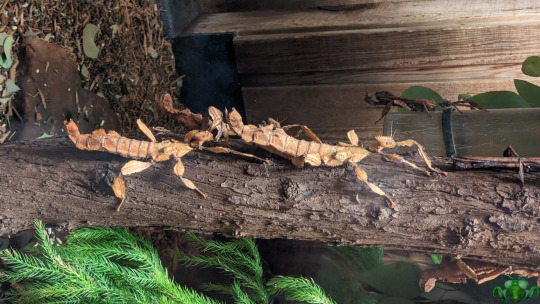
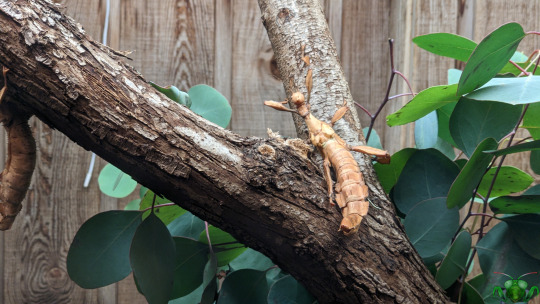
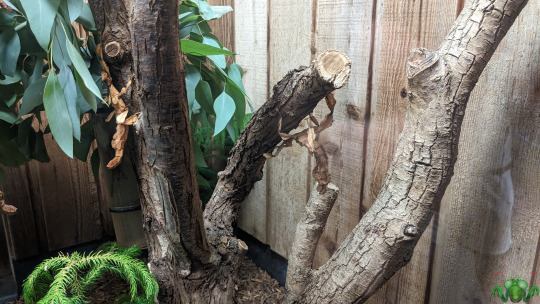
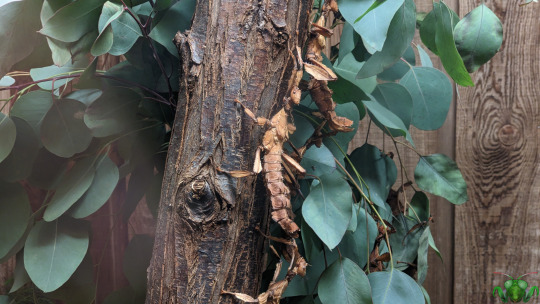
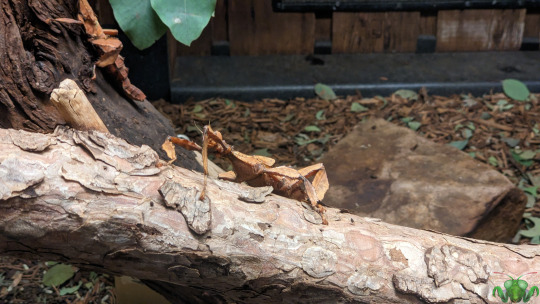
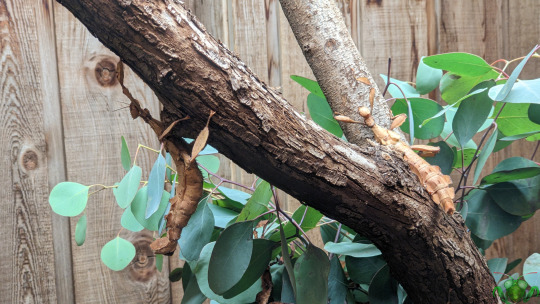



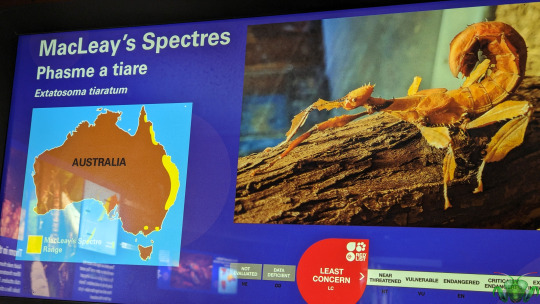
Spiny Leaf Insect - Extatosoma tiaratum
It's been many years since I've laid my eyes on one of these magnificent creatures, and even longer since my days at U of T where I held one in my hand. As such, it was gratifying to see so many individuals on display at the Toronto Zoo and to soak in all their details and movements (mostly wobbles and slow, methodical steps) while observing them. With many female individuals, and a few different instars among them, I should have taken a video, but there was lots of excited screaming in the background from children happy to see the otters and reptiles. As much as I love animals, this blog is all about the insects, and so today we have pictures of these Giant Prickly Stick Insects. Today, they are known by many names such as Australian Walking Sticks, Spiny Leaf Insects, Macleay’s Spectres (named for British entomologist William Macleay and referencing their order Phasmatodea, whose name is derived from apparitions or more commonly, ghosts) or E. tiaratum. You can call them many names, just don't call them "Leaf Insects" as those are a different branch of Phasmid, of the family Phylliidae. Amazing as that family is are, these large armored insects also have a certain special quality to them. Maybe it's just how large and unusual they are compared to our fauna, but I certainly think that they're eye-catching when they can actually be found and observed. In the wild, finding them could be more difficult since their mottled, spiked, dried-in-appearance leafy armor is meant to hide them from their predators.
These peaceful, plant-eating giants need every advantage they can secure since they aren't aggressive and are burdened with slow movement due to their armor. In most cases, if anything gets close, their "scorpion" posture combined with a mild chemical defense and their sharp spines may be just enough. But what if you're a thinner, more agile male? If you've been observant, there is one such darker individual in the background of Picture 1! They're quite different in appearance from females, being much smaller and they are also quite rare! Moreover, a mild reliance on using parthenogenesis to reproduce and lay eggs, they can become even rarer! The thin male has functioning wings and can use them when in danger by either flying away or flashing them to a predator, startling them. Naturally, wings also allow for a wider dispersal and an expansion to the search for fertile females. In an environment within captivity, the presence of a male may be likely to discourage parthenogenesis and in fertilized eggs that will hatch earlier after females drop them to the soil floor. There were no eggs to be found, so if you plan to visit and search for them, look for brown and white, seed-like objects fitted with a capsule-like projection (capitulum). They are likely to be removed and stored, as the eggs of E. tiaratum are reported to need cooler conditions to successfully hatch. Their terrarium may simulate a warm, tropical environment too well in that case. In the wild, Ants fulfill this condition, bringing the "seeds" underground into their cooler subterranean food stockpile.
These insects are exhibited in the Toronto Zoo, so I’ve marked them with the Mantis icon. Pictures were taken August 27, 2023 at the Toronto Zoo with a Google Pixel 4. Please go and visit the animals (insects very much included).
#jonny’s insect catalogue#ontario insect#stick insect#spiny leaf insect#macleay's spectre#phasmatodea#phasmid#insect#toronto#toronto zoo#august2023#2023#nature#entomology#invertebrates#arthropods#animals#photography
17 notes
·
View notes
Text
Spiny leaf insect,
Extatosoma tiaratum
4 notes
·
View notes
Note
Do you like leaf bugs? (as in the kind that look like leaves lol they probably have a more official name)
You mean the order Phasmatodea correct? (I'm practicing using the scientific names) I love them so much!!! I believe I've only seen walking sticks and haven't seen any leaf bugs (yes they are commonly called that) yet. My favorite is the giant prickly leaf insect (Extatosoma tiaratum).

Image source
Some morphs make them look like, well, lichen!

Image source
Hehe look how tiny

Image source
5 notes
·
View notes
Note
Ahhh you have stick insects?? Show me please 👀👀👀👀
Of course! 💚😌
I said 'stick insects' in the tag game because I didn't know the right English term for 'Gespenstschrecken'. Not 'stick insects' but 'ghost insects'.
Get ready for some cute pics!! 🥺 I took these photos a few years ago and my beloved insects are in insect Heaven now, but I really wanna get back into the hobby 😌
Sungaya inexpectata, female / her Name was Paige

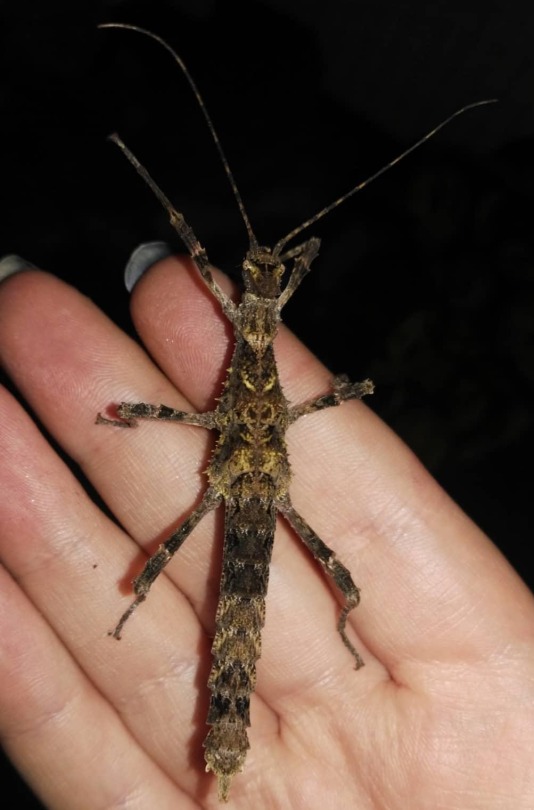
She had a boyfriend and his name was Skinny (😏). After their mating session I had sooo many eggs and babies. It was a mess.
Extatosoma tiaratum / Australische Gespenstschrecke / her name was Laurie

When this little cutie arrived, she only had five legs and I needed to be very gentle with her. Then she molted... and she was even prettier!
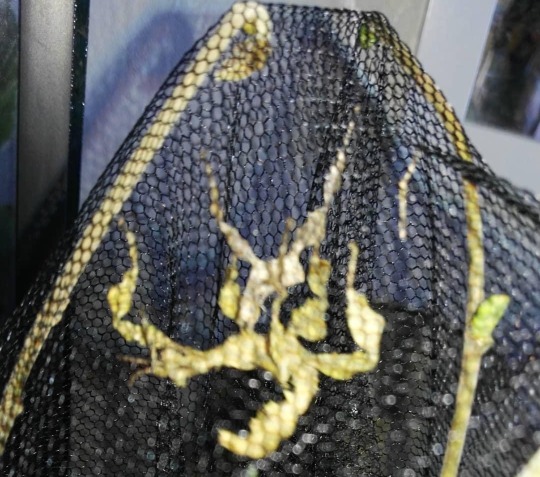
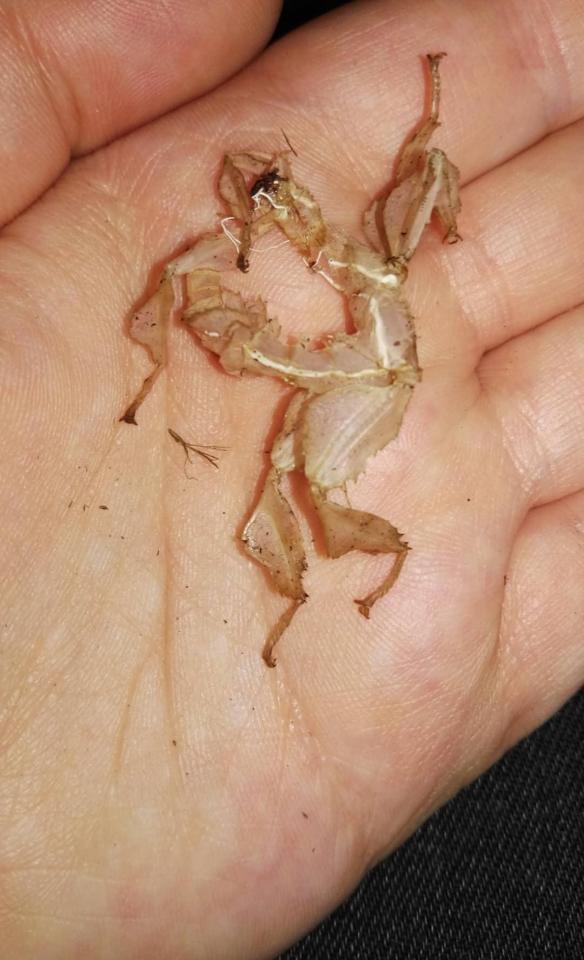
I called her 'my little dragon' or 'dinosaur'. What makes the Australian walking stick so fascinating is that their walk is really wobbly. They imitate a leaf moving in the wind! So they're just dancing around all the time!
They strike a defense pose when threatened and sometimes lash out at you to scare you off.

Archispirostreptus gigas / Afrikanischer Riesentausendfüßer / their names: Bob & Justus

I had two of them and they were really chill. They spray a stinky liquid onto your skin, when they feel threatened. Just like a ladybug. But handling them was quite cool. They crawled over my arms and just sat on my shoulder, while I cleaned their enclosure.
I'm sorry! This post is really long, but I love insects so much and I'm soo happy you asked! 💚😊 Thank you!!
5 notes
·
View notes
Photo
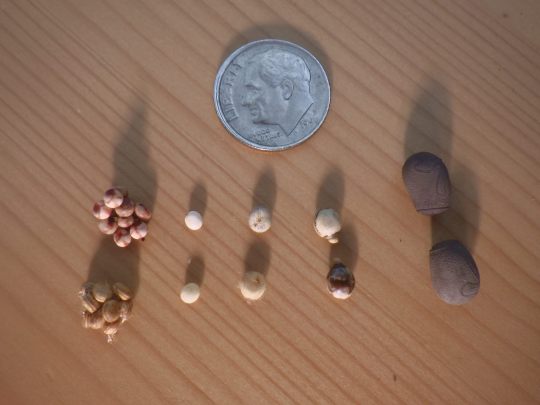
Insect eggs from left to right: clusters of Atlas moth eggs; Saturniid moth eggs; Madagascan comet moth eggs; Extatosoma tiaratum eggs (Macleay’s Spectre Stick Insect); Heteropteryx dilatata eggs (Jungle Nymph Stick Insect).
#egg#eggs#insect#insects#insect egg#insect eggs#moth#moths#atlas moth#atlas moths#moth egg#moth eggs#saturniid#saturniids#madagascan comet moth#madagascan comet moths#stick insect#stick insects#stick insect egg#stick insect eggs#macleay's spectre stick insect#extatosoma#extatosoma tiaratum#jungle nymph stick insect#heteropteryx#heteropteryx dilata#nature
2 notes
·
View notes
Video
youtube
Laying eggs is hard work: Extatosoma tiaratum
0 notes
Text
Ooo you bet, thanks for the tag!
Come join the toxic gossip train @willisek @morti0re @yxizor
Trinket tag game
tag game: pick stuff from your room and have people vote on which one they want to take home.
@just-prime tagged me (and maybe someone else a few days ago but I forgot, sorry)
okay, let's see what I have to offer...
I'm tagging @moorishflower, @potato-lord-but-not, @amielot and @karalynlovescake, no pressure of course ^^
442 notes
·
View notes
Text
SUBMISSIONS FOR THE BADASS BUG BRACKET HAVE CLOSED!
MEET THE COMPETITORS BELOW THE CUT!
Black and red chalcid wasp (Conura lasnieri)

Death's head hawkmoth (Acherontia atropos)

Dragon mantis (Stenophylla lobivertex)

Synagris proserpina

Eastern Dobsonfly

Amazonian giant centipede (Scolopendra gigantea)

Wasp-mimic hoverfly

Gigantiops Destructor

Giant desert centipede (Scolopendra heros)

Pharaoh cicada (Magicicada septendecim)

Vulture wasp (trigona hypogea)

Meganeura monyi

Praying Mantis (Mantis religiosa)

Devil's flower mantis (Idolomantis diabolica)
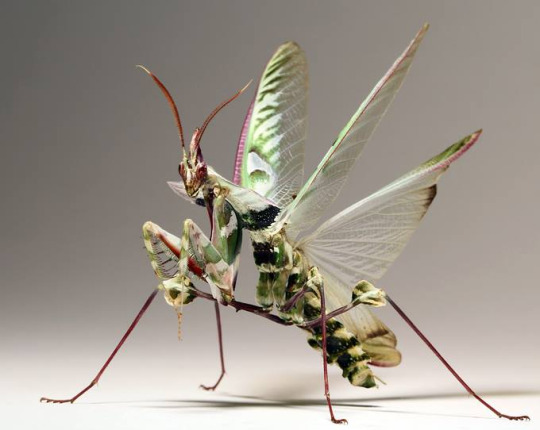
Baphomet moth (creatonotos gangis)
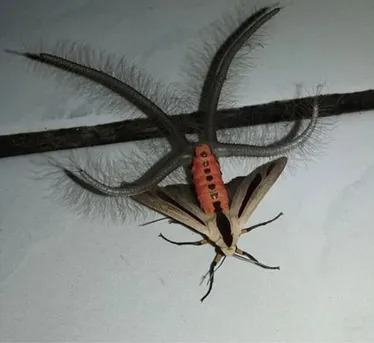
Platerodrilus

Armored spiny ant (polyrhachis armata)

Cecropia moth (hyalophora cecropia)

Malaysian moon moth (actias maenas)

Scorpion fly (panorpa nuptialis gerst)

Bamboo weevil (cyrtotrachelus longimanus)

Executioner wasp (polistes carnifex)

Tarantula hawk (pepsis grossa)

Red velvet ant (dasymutilla occidentalis)
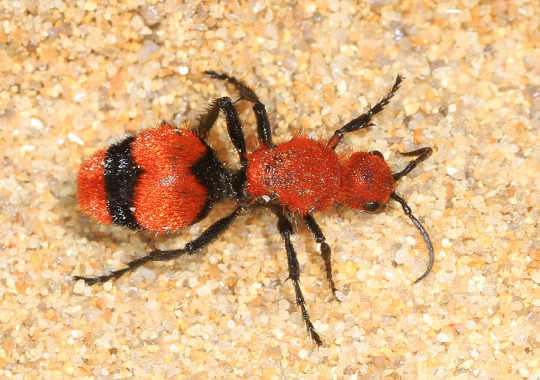
Diabolical ironclad beetle (phloedes diabolicus)

Zelurus obscuricornis

Three horned rhino beetle (chalcosoma moellenkampi)

Grapeleaf skeletonizer (harrisina brillians)

Giant prickly stick (extatosoma tiaratum)

Cicada Killer (sphecius speciosus)

Texas leafcutter ant (atta texana)
Wheel bug (arilus cristatus)
I hit the image limit at the end lol
THE TOURNAMENT WILL BEGIN SOON!
#bugblr#insectblr#bugs#insects#bug#insect#ant#entomology#beetle#mantis#centipedes#moth#wasp#butterfly#weevil#cicada#fly#the badass bug bracket#poll tournament#bracket tournament
14 notes
·
View notes
Photo

¡Hola amigos! El día de ayer fui a Tuzoofari , ubicado en Epazoyucan en el Estado de Hidalgo, a unos 20 minutos de Pachuca y la verdad es que fue una gran experiencia, pude observar de cerca a cientos de animales de especies distintas de casi todas partes del mundo, conocí el herpetario y parte de la hacienda, no me alcanzó el tiempo para recorrerlo todo pero volveré pronto a visitarlos. Las exposiciones de la hacienda están geniales ya que hay objetos antiguos y hay hadas en todas partes las cuáles tienen la función de enseñar esa conexión con la naturaleza y el cuidado de esta. Aproveché y realicé una pequeña donación para el museo de la hacienda y aprovechando el post nos es grato informar que Sr Nahual estará trabajando en un nuevo proyecto con @tuzoofarioficial @tuzoofari_hgo , en algunas semanas irán viendo las sorpresas que les tenemos preparadas. Recuerden apoyar museos y zoológicos realizando donaciones, compras o simplemente visitándolos. 🦎🐍🦓🦌🐪 #sr_nahual #arthropods #scolopendra #tarantula #hicking #beetle #insectsofinstagram #extatosoma #coleoptera #scarabaeidae #dynastes #megasoma #cetoniinae #spidersofinstagram #rutelinae #arthropodsofinstagram #arthropodsofinstagram #escarabajos #brachypelma #hicking #outdoors #nature #camping #mexico #dynastinae #cerambycidae #chrysomelidae #theraphosidae #nature #phasmidsofinstagram #tuzoofari (en Tuzoofari Oficial) https://www.instagram.com/p/CiA7iIvrsrB/?igshid=NGJjMDIxMWI=
#sr_nahual#arthropods#scolopendra#tarantula#hicking#beetle#insectsofinstagram#extatosoma#coleoptera#scarabaeidae#dynastes#megasoma#cetoniinae#spidersofinstagram#rutelinae#arthropodsofinstagram#escarabajos#brachypelma#outdoors#nature#camping#mexico#dynastinae#cerambycidae#chrysomelidae#theraphosidae#phasmidsofinstagram#tuzoofari
2 notes
·
View notes
Photo
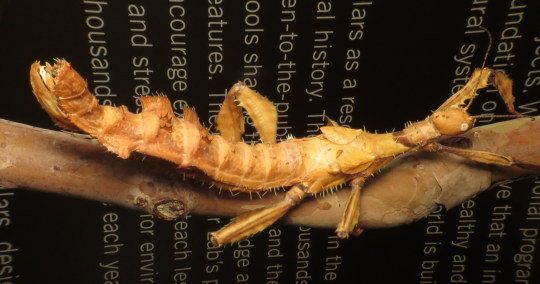
Bug of the Day
Had a nice shot of #buglife earlier this week at The Caterpillar Lab, including this awesome huge giant prickly stick insect (Extatosoma tiaratum)
#Extatosoma tiaratum#Extatosoma#giant prickly stick insect#Phasmatidae#phasmid#spiny leaf insect#Phasmatodea#Phasmida
149 notes
·
View notes
Text
creacher delivery, sorry for the delay!!
this is the Giant Prickly Stick Insect!! (Extatosoma tiaratum)

hope this fits well!!
i wanna meet other selfshipper accs and i wanna bugpost as well!! so!!
Reblog this post with a name and picture of your F/O and I will assign them a bug species!!
feel free to add on as many f/os as you like aswell!!
proship dni pls and ty!!
138 notes
·
View notes